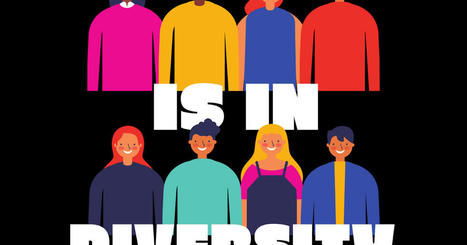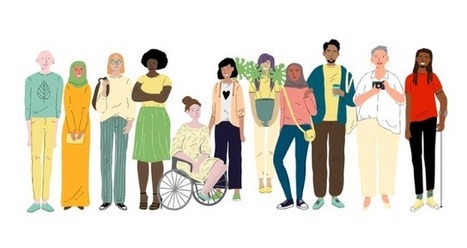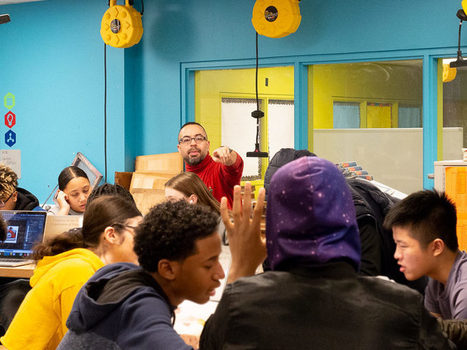 Your new post is loading...
 Your new post is loading...
There's a common misconception that science is inherently neutral and objective, absolving it of any responsibility for racist beliefs and practices. However, many of the scientific advancements we celebrate are rooted in racism and sexism. Numerous medical cures and breakthroughs, including the polio vaccine and recent developments towards an HIV vaccine, required HeLa cells. Notably, these HeLa cells were stolen from Henrietta Lacks, a Black woman, without her consent in 1951. Furthermore, within the vast scope of science history, men have continuously taken credit for women's intellectual work in science, a pervasive phenomenon known as the Matilda Effect.
Making learning accessible through an inclusive learning community is crucial for all students to feel seen, valued, and to maximize their potential by implementing a safe space (CAST, 2018). Ensuring that all students feel included is especially vital in remote learning, where they are likely to feel less connected to others to begin with. Universal Design for Learning (UDL), which maximizes student performance and success, argues that inclusion is a prerequisite for academic success (CAST, 2018). This manuscript offers recommendations to combat prejudice and implement an inclusive learning environment by bringing equity to the forefront to better support minority students and improve their academic experiences and outcomes. Though this paper mainly focuses on supporting students of color, many of these teaching strategies can also benefit students of different marginalized identities, such as LGBTQA+ students or international students navigating North American culture.
Just after our university published its Diversity, Equity & Inclusion (DEI) Strategic Plan, I found myself driving home from the “Engaging with the ACRL Framework” Roadshow. My head was full of converting knowledge practices into learning outcomes when the frames began to emerge through a DEI lens, and threshold concepts became questions. The very asking of a question inherently invites diverse, individual perspectives. Published before current higher education DEI efforts, the Framework prompts us to ask questions and pursue answers, especially from unheard or systemically silenced voices. It encourages us to challenge elitism, racism, sexism, ableism, and biases within the entire information ecosystem.
9.30 - 10.00 Registration 10.00 Welcome and housekeeping 10.15 - 11.00 Group Discussion. 11:00-11:40 Presentation 11.00 - 11.40 Decolonising LSE Collections - Kevin Wilson (London School of Economics) 11.40 - 11.50 Tea break 11:50 - 13:10 Presentations 11.50 - 12.30 Broaden my Bookshelf: working with the University of Huddersfield SU to tackle the attainment gap -…
Many people know education systems around the world are struggling. Students are often disengaged, even when they are little, and it can seem as if they don't care. Often, though, they care a lot - the material just doesn't come in quite the right form. Including students in the learning process can make a big difference, especially if their unique perspectives are drawn into the room so that everybody learns from each other. These are some steps for 'decolonising the curriculum' and making the classroom more inclusive that any teacher, in any discipline, can do to meet their students where they are at.
The typical edtech conference buzzes with gadgetry, infrastructure and new ways to engage students. Most session tend to focus on new apps or software over deep dives into pedagogy and building better relationships. There’s nothing inherently wrong with that—the world needs both. But when was the last time you hear someone talk about racism or digital equity? Where are the conversations about reaching all learners and examining our own biases as educators?
For many professors, teaching is the most time-consuming — and rewarding — part of their job. It’s also one that few instructors have had much formal training in, leaving many to learn through trial and error.
One good shortcut, then, is learning from the experiences of others.
The Chronicle asked a few professors known for their teaching to tell us about an experience that changed what they do in the classroom. Here’s what they said:
Two items: Firstly, the North American Association for Library and Information Science Education (ALISE) has made a statement on diversity.
|
Our classrooms are culturally diverse with students coming from different racial, linguistic, and ethnic backgrounds. Diversity is a pedagogical strength which we should draw on to prepare culturally responsive spaces where students learn about the importance of respecting and accepting each other's cultural practices. As the adage goes, diversity is the spice of life and cultural awareness is the antidote to prejudice, racism, bias, sexism, homophobia, ableism, and discrimination.
Being culturally responsive is a critical and necessary feature of our interactions with one another. It is also vitally important in the context of education. Culturally responsive teaching is an approach that “empowers students intellectually, socially, emotionally, and politically by using cultural referents to impart knowledge, skills, and attitudes” (Ladson-Billings, 2014). The following practices provide five essential strategies for how educators can make their learning environments more culturally responsive.
Creating a successful learning experience is at the heart of instructional design and delivery. “In addition to academic instruction, one of a classroom’s teachers most important roles is to help students develop the critical thinking, collaboration, and self-reflection skills necessary to foster a better society” (Blacke, 2015, para. 1). Encouraging students to explore the topics of power and privilege resulting from social classifications and their impact on the thoughts and actions of themselves and others is an important step toward encouraging social justice. However, creating a classroom environment that facilitates and supports discussions about sensitive topics can be challenging.
NEW YORK — At New York City’s Urban Assembly Maker Academy high school in lower Manhattan, two things immediately stand out. First, its teachers are rarely standing at the front of the classroom dispensing facts and figures for students to dutifully transcribe. Instead, they’re constantly on the move, going from table to table facilitating group discussions and providing feedback as students work. Second, the students reflect the racial diversity of the city. Within one of the nation’s most segregated school systems, Maker Academy has attracted a mix of black, Latino, white and Asian students in which no single group makes up less than 10 percent or more than 46 percent of the population.
How diverse is your reading list? Addressing issues of representation in the sciences and social sciences. By Karen Schucan Bird (UCL Institute of Education) k.bird@ucl.ac.uk
Lesley Pitman (UCL Library Services) With thanks to Mahmoud Arif and Jin Gao.
Is this the future of educational change?
So, you’ve produced a list of 8 books that every ‘Modern Educational Change Leader’ must read, and you realize it’s mostly white men. More Seymours than women, to be precise. What should you do?
Who am I to speak about diversity and inclusion? I am a middle-aged white woman from an upper-middle-class family. I have been afforded numerous opportunities many of my students never have been, and possibly never will be, afforded. I am the picture of privilege.” This is what I told myself at times when the topics of diversity and inclusion came up. However, when you look at the racial/cultural makeup of most college campuses, if faculty “like me” do not broach the sensitive topics of diversity and inclusion, who will?
|



 Your new post is loading...
Your new post is loading...




















